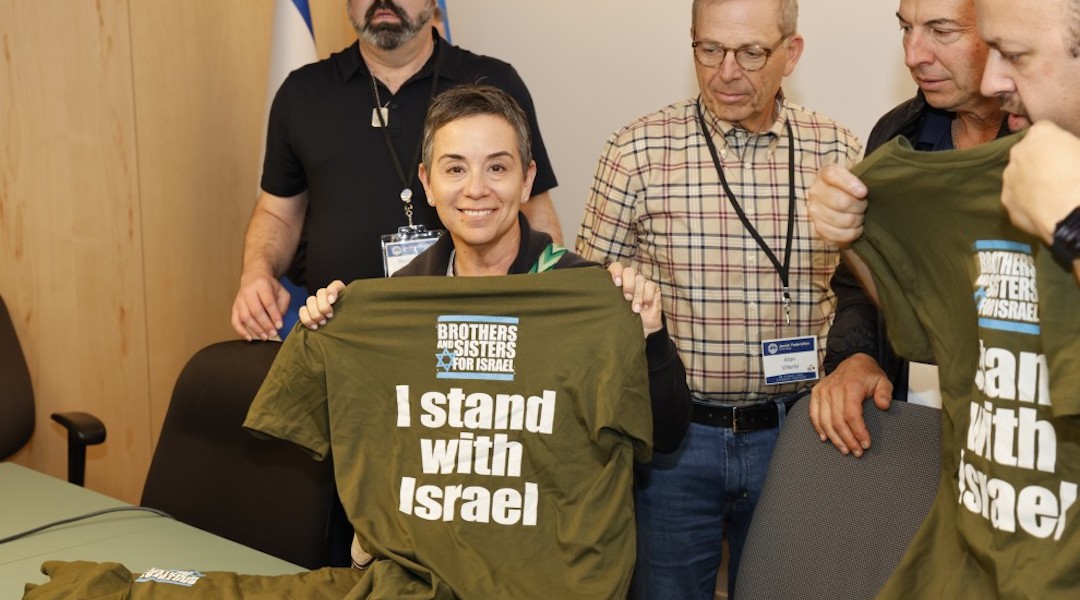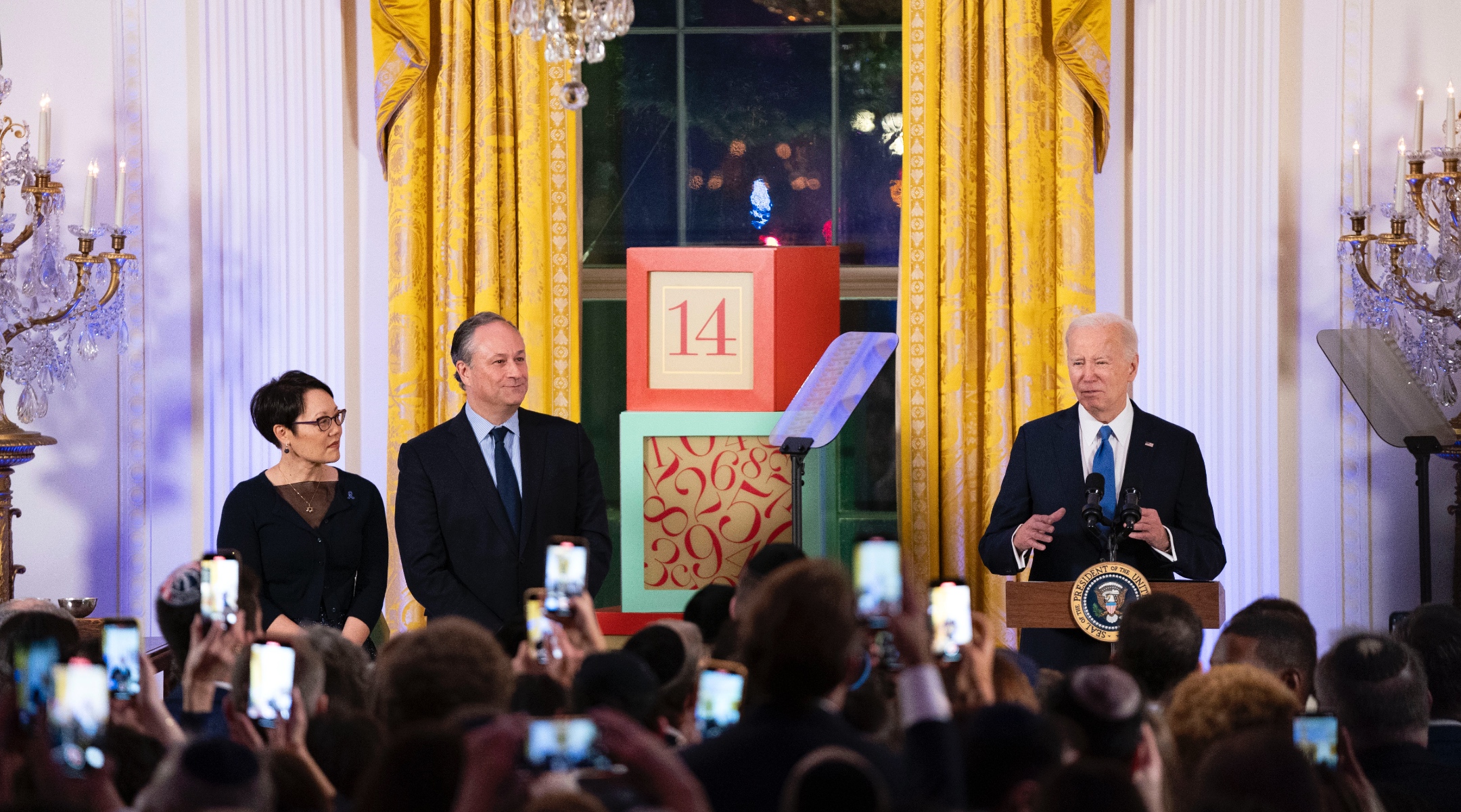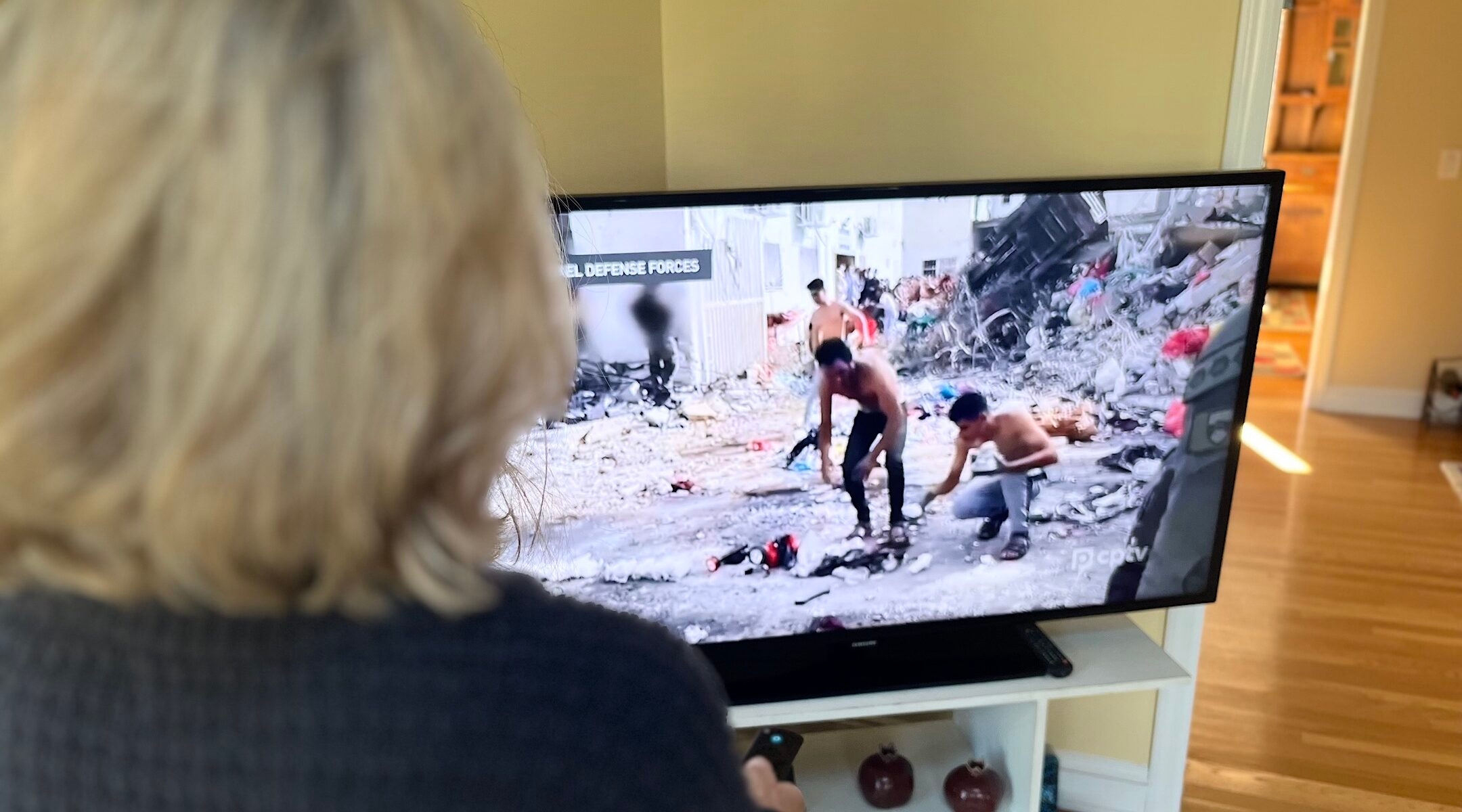(JTA) — Rabbi Yael Ridberg recently returned from a four-day mission to Israel with the Jewish Federation of San Diego, which has a 25-year sister-city relationship with Sha’ar HaNegev, a municipality near the Gaza border. Their group witnessed firsthand the destruction and devastation left after the Oct. 7 Hamas attack on Israel’s south; among the 1,200 killed was Sha’ar HaNegev’s mayor, Ofir Libstein, who was slain while defending Kibbutz Kfar Aza.
“When I came back,” she said, “and I started to share a little bit about the experience, a few of my congregants, we might call them center left, came away from what I shared feeling, ‘Yes, of course, it’s horrifying. But how can I resist looking away from the footage and the coverage in Gaza?’”
Ridberg, 55, says she understands the “anguish” of these congregants at her synagogue, Congregation Dor Hadash in San Diego. Supporters of Israel, they were plunged into grief by the Oct. 7 murders and hostage-taking and disgusted when allies on the left failed to acknowledge or even justified the suffering of the Jewish victims. Nonetheless, they are appalled by the enormous death toll in Gaza as a result of Israel’s two-month counteroffensive and harboring doubts about Israel’s end-game.
“I think my community is a perfect representation of that sort of quiet middle: People are very clearly supportive of Israel, horrified by the events of Oct. 7, stymied by the silence around the hostages, stymied by antisemitism everywhere — and at the same time, are trying to figure out how to feel as okay as possible with the IDF plan, which for some of them, they’re not sure what that plan is,” said Ridberg.
“And the farther we get away from October 7,” she said, “the harder it is for some of them to feel fully grounded in what that support needs to look like.”
Since the start of the war between Israel and Hamas, much has been made of the political divide between an older generation of Jews who take Zionism for granted and a younger generation who are less attached to Israel than their elders.
But even among firm supporters of Israel, who back Israel’s right to defend itself and accept its goal of eradicating a deadly enemy, are those who feel neither at home in the Jewish left — which includes anti-Zionists who have opposed Israel’s retaliation from its beginning — or in the mainstream which they say is uncritical of the Israeli war effort.
“I’m someone who looks at what seems to me to be quite inflammatory language from the American left decrying Zionism, and I recoil as someone who believes that Israel has a right to exist,” said Michael Pasek, 33, assistant professor of psychology at the University of Illinois, Chicago, who has studied the psychology of the Israeli-Palestinian conflict. “And yet, I then look at actions taken in the name of quote Zionism, that seem to be endorsed by quote, Zionists, and ask myself, What am I closer to?”

Rabbi Yael Ridberg meets with leaders of Achim L’Neshek-Brothers and Sisters for Israel — a civilian operations center in Tel Aviv — during a mission to Israel with the Jewish Federation of San Diego, Nov. 30, 2023. (Guy Yechiely/Jewish Federation of Sand Diego).
Whether they call it “stuck in the middle” or “threading the needle,” these are Jews who wouldn’t join a Jewish-led protest calling for a ceasefire, but bristle at some of the messages of unquestioning solidarity heard during pro-Israel rallies led by mainstream Jewish groups.
“I am too progressive for the Zionists and too Zionist for the progressives,” writes journalist Steven Zeitchik in a JTA essay. A longtime reporter at the Washington Post and founder of a tech newsletter, Zeitchik finds himself caught between the militancy of his father, who as a child lost two of his siblings in the 1948 War of Independence and who experienced the Oct. 7 atrocities as a fresh trauma, and the empathy he feels for innocents caught in the line of fire. “Perhaps that is my place, tilted between trauma and empathy,” he writes. “Perhaps that is the curse of the survivor’s son. You are destined to live in the lonely middle — haunted by everything, aligned with no one.”
That sense of loneliness is exacerbated by the poisonous discourse on social media, where nuance is dismissed by one side as collaboration with the other side. Many American Jews also have friends and relatives in Israel, including some in the army and some whose relatives were taken hostage, and are wary of appearing critical or ambivalent about the war when the country is unified around it. A few I spoke to did not want to be identified out of deference to these friends and relatives.
Many Jews are also wary of appearing to support a far left that is accusing Israel of carrying out a “genocide” — often the same groups endorsing a ceasefire.
Many of the people I spoke to for this article said they noticed a shift in recent weeks, as the grief, anger and solidarity felt after Oct. 7 gave way to more complicated feelings about the war.
That shift could be seen in the person of President Joe Biden — not Jewish, but a pro-Israel politician whose initial, horrified reaction to the Hamas attacks and the green light he gave to Israel seemed to mirror the feelings of so many Jews. As the death toll has risen in Gaza and the humanitarian crisis worsens, Biden has signaled that his patience is running out, and that Israel must take more care to protect civilians, ensure more deliveries of humanitarian aid and — while still firmly avowing his support of Israel.
“There’s a sense of people wanting to be more clear that they are resolutely committed to the people of Israel, which is not the same thing as the government of Israel,” said Jeremy Burton, CEO of the Jewish Community Relations Council of Greater Boston, when I asked if he has seen a shift in his community. “Folks are still very much holding their anger, their grief, their core issues like freeing the hostages. But there’s been an increasing sense of the importance of addressing the long-term commitment to a larger resolution of the conflict and genuine concern over Palestinian civilians. It’s holding those things together.”
Coinciding with the administration’s shift is one on the Jewish left. While far-left groups like IfNotNow and Jewish Voice for Peace began demanding a ceasefire within days of the war, and cast the war almost exclusively in terms of Palestinian suffering and Israeli culpability, left-leaning groups like J Street and T’ruah were careful to weigh calls for peace with empathy for Israel. Over 750 rabbis and cantors signed a T’ruah letter written and circulated beginning Oct. 20 that condemned the Hamas attacks, praised the “extraordinary response by Israel’s civil society,” and called for “a just, negotiated political solution that protects the human rights and political self-determination of both peoples.” The letter did not mention a ceasefire, but rather called on “all parties to follow the laws of armed conflict in order to ensure the safety of Israeli and Palestinian civilians.”
On Thursday, nine weeks later and with the reported death toll in Gaza at over 18,000, T’ruah put out a new statement calling on the Biden administration “to pressure Israel to return to the negotiating table to reach another ceasefire and end the war.”
J Street also toughened its stance on Israel since October, issuing on Dec. 7 a statement saying that if Israel “fails to modify the nature of the military campaign or to take the steps urged by the United States, J Street will call on the Biden administration to change course.”

President Joe Biden, Second Gentleman Doug Emhoff and Rabbi Angela Buchdahl of Central Synagogue in New York City host a Hanukkah reception in the East Room of the White House, Dec. 11, 2023. “We continue to provide military assistance to Israel until they get rid of Hamas,” Biden said at the event. “But we have to be careful. They have to be careful. The whole world’s public opinion can shift overnight. We can’t let that happen.” (Bonnie Cash/Pool/Getty Images)
Both T’ruah and J Street are widely seen as to the left of where most U.S. Jews are, and they certainly don’t speak for a conservative minority — common but not restricted to the Orthodox community, who tend to be hawkish on Israeli policy, including strong support for the settlement movement in the West Bank.
But polls show that most Jewish Americans identify as Democrats, feel attached to Israel and support a two-state solution to the Israeli-Palestinian conflict.
“Most Jews are somewhere in the middle — you know, kind of hawkish doves or dovish hawks,” said Dov Waxman, 49, director of UCLA’s Y&S Nazarian Center for Israel Studies. “They’re concerned about the safety of Israel and Israelis that’s genuine, but at the same time, they also care and they’re also concerned about human rights and supportive of a two-state solution.”
Waxman said there aren’t polls at the moment gauging Jewish attitudes to the war, but in his conversations with Jewish leaders — including a group of non-Orthodox rabbis he met with on Thursday — he’s seen a definite shift since the first month.
“There are growing concerns and qualms about the war not in terms of a justification for going after Hamas, but over the costs of this war on Palestinian civilians in Gaza,” he said. “In addition to the displacement and humanitarian crisis, there are concerns about Israel’s conduct of the war in terms of whether it is really doing its best to minimize casualties.”
This balancing act — between empathy and outrage over the trauma inflicted on Israel, and qualms about the destruction of Gaza and the war’s aftermath — are also being heard in the sermons of rabbis who are strongly supportive of Israel.
On Dec. 9, in her Shabbat morning sermon, Rabbi Sharon Brous of the independent IKAR congregation in Los Angeles warned about the impulse to dehumanize the Palestinians in Gaza. “I am not a military strategist. I do not dare to suggest that I know how Israel is supposed to keep its people safe after Hamas has demonstrated through atrocities mimicking those of the most sadistic divisions of the” Nazis, she said. And yet, she continued, Jews must “muster the moral imagination to reckon with the other not as a bloodthirsty predator but perhaps as a parent, just like us, also aching for their lost child.”
In his Shabbat sermon on Dec. 2, Rabbi Jesse Olitzky of the Conservative Congregation Beth El in South Orange, New Jersey decried the silence of women’s and humanitarian groups over allegations of sexual violence carried out by Hamas terrorists. And while he acknowledged the realities of war and inevitable casualties that result in pursuit of a justified objective like holding Hamas accountable, he said Torah asks that “we not use our anger and our grief to take it out on everyone. I don’t know how to do that. I don’t know how to get there.” But Torah he said, “deems” Jews to strive for restraint even when “we don’t always get there.”
Waxman said the strong consensus seen in the first month of the war is also being eroded by concerns over the ultimate aims of the Israeli government, a far-right coalition that, as Biden recently said, “does not want a two-state solution.” Waxman hears “doubts about whether Israel is going to be able to achieve its goals in the war. What are its plans for the future of Gaza? There’s the concern that this could easily end up in a long-term Israeli occupation of the Gaza Strip, even if that’s not what Israel wants.”
Dara Lithwick, 46, a rabbi and lawyer in Ottawa, Ontario who chairs the Reform Jewish Community of Canada’s Tikkun Olam Steering Committee, worries that a binary discourse that rejects “multiple perspectives” has “drowned out” the voices of people and groups working toward a better future for Israeli and Palestinians. Among the groups she mentioned are Hand in Hand, a network of joint Arab-Israeli schools in Israel; the Association for Civil Rights in Israel, and the coexistence group Standing Together. Although such groups tend to be described as left-wing, they are also dismissed by Israel’s harshest critics as “normalizing” Israel.
“The only way I can imagine getting to the next place is by continuing to build connections across lines of difference,” she said. “It doesn’t need to be about solutions, but just in terms of our mutual humanity and holding each other up.”
She said her parents, whom she describes as “pretty centrist” professionals, are also struggling with their feelings after two months of the war. They sympathize with Israel’s goal of preventing another Oct. 7, but feel anguish at the death of children in Gaza, and lack trust in the current Israeli government and wonder what the long-term solution will be.
“They are heartbroken by what is going on,” said Lithwick.
Michael Pasek also worries that Israel is carrying out the war — and Jewish organizations are supporting it — without a vision of a lasting solution. “I am someone who thinks that Zionism should be compatible with a two-state solution,” he said, “but I don’t see many leaders of Israel and, quite frankly, American Jewish mainstream organizations, advocating for Zionism in a way that I think is compatible with that.”
“This is a really, really hard struggle for the most Zionist among us and the most peace-loving among us,” said San Diego’s Rabbi Ridberg. To describe the tug she feels in both directions — toward unwavering support for Israel and concern over the Palestinians – she quotes the Tamudic sage Hillel: “If I am not for me, who will be for me? And when I am for myself alone, what am I?”
“I am fully supportive of this just war and its mission, and my struggle every single day is a responsibility that we have in both directions, according to Hillel,” she said. “How do I absorb the full impact of this war on Israel and Gaza?”
JTA has documented Jewish history in real-time for over a century. Keep our journalism strong by joining us in supporting independent, award-winning reporting.







